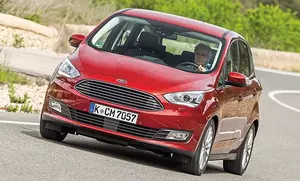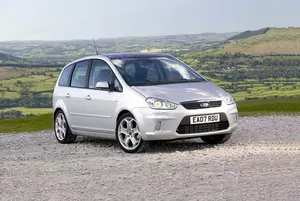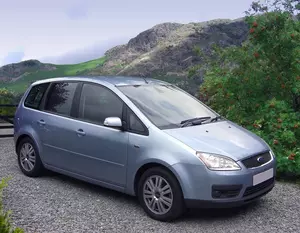
| Vehicle | Precise engine size | Difference from world average | Engine size to consumption ratio | Horsepower from 1 L | Engine size to 100 kg of weight |
|---|---|---|---|---|---|
| 1.0 EcoBoost |
1 L (998 cc) |
57.5% smaller | 22 cc to 1 mpg | 100 hp from 1 L | 71 cc to 100 kg |
| 1.5 EcoBoost |
1.5 L (1499 cc) |
36.1% smaller | 42 cc to 1 mpg | 100 hp from 1 L | 107 cc to 100 kg |
| 1.6 Ti-VCT |
1.6 L (1596 cc) |
32% smaller | 43 cc to 1 mpg | 53 hp from 1 L | 114 cc to 100 kg |
| 1.5 TDCi |
1.5 L (1499 cc) |
36.1% smaller | 28 cc to 1 mpg | 80 hp from 1 L | 100 cc to 100 kg |
| 2.0 TDCi |
2 L (1997 cc) |
14.9% smaller | 41 cc to 1 mpg | 85 hp from 1 L | 133 cc to 100 kg |
| 1.6 TDCi |
1.56 L (1560 cc) |
33.5% smaller | 30 cc to 1 mpg | 74 hp from 1 L | 111 cc to 100 kg |
| 1.5 ECOnetic |
1.5 L (1500 cc) |
36.1% smaller | 24 cc to 1 mpg | 70 hp from 1 L | 115 cc to 100 kg |
| 2.0 |
2 L (1999 cc) |
14.8% smaller | 53 cc to 1 mpg | 71 hp from 1 L | 111 cc to 100 kg |
| Vehicle | 1.0 EcoBoost |
|---|---|
| Precise engine size | 1 L (998 cc) |
| Difference from world average | 57.5 smaller |
| Engine size to consumption ratio | 22 cc to 1 mpg |
| Horsepower from 1 L | 100 hp from 1 L |
| Engine size to 100 kg of weight | 71 cc to 100 kg |
| Vehicle | 1.5 EcoBoost |
| Precise engine size | 1.5 L (1499 cc) |
| Difference from world average | 36.1 smaller |
| Engine size to consumption ratio | 42 cc to 1 mpg |
| Horsepower from 1 L | 100 hp from 1 L |
| Engine size to 100 kg of weight | 107 cc to 100 kg |
| Vehicle | 1.6 Ti-VCT |
| Precise engine size | 1.6 L (1596 cc) |
| Difference from world average | 32 smaller |
| Engine size to consumption ratio | 43 cc to 1 mpg |
| Horsepower from 1 L | 53 hp from 1 L |
| Engine size to 100 kg of weight | 114 cc to 100 kg |
| Vehicle | 1.5 TDCi |
| Precise engine size | 1.5 L (1499 cc) |
| Difference from world average | 36.1 smaller |
| Engine size to consumption ratio | 28 cc to 1 mpg |
| Horsepower from 1 L | 80 hp from 1 L |
| Engine size to 100 kg of weight | 100 cc to 100 kg |
| Vehicle | 2.0 TDCi |
| Precise engine size | 2 L (1997 cc) |
| Difference from world average | 14.9 smaller |
| Engine size to consumption ratio | 41 cc to 1 mpg |
| Horsepower from 1 L | 85 hp from 1 L |
| Engine size to 100 kg of weight | 133 cc to 100 kg |
| Vehicle | 1.6 TDCi |
| Precise engine size | 1.56 L (1560 cc) |
| Difference from world average | 33.5 smaller |
| Engine size to consumption ratio | 30 cc to 1 mpg |
| Horsepower from 1 L | 74 hp from 1 L |
| Engine size to 100 kg of weight | 111 cc to 100 kg |
| Vehicle | 1.5 ECOnetic |
| Precise engine size | 1.5 L (1500 cc) |
| Difference from world average | 36.1 smaller |
| Engine size to consumption ratio | 24 cc to 1 mpg |
| Horsepower from 1 L | 70 hp from 1 L |
| Engine size to 100 kg of weight | 115 cc to 100 kg |
| Vehicle | 2.0 |
| Precise engine size | 2 L (1999 cc) |
| Difference from world average | 14.8 smaller |
| Engine size to consumption ratio | 53 cc to 1 mpg |
| Horsepower from 1 L | 71 hp from 1 L |
| Engine size to 100 kg of weight | 111 cc to 100 kg |

| Vehicle | Precise engine size | Difference from world average | Engine size to consumption ratio | Horsepower from 1 L | Engine size to 100 kg of weight |
|---|---|---|---|---|---|
| 1.0 EcoBoost |
1 L (998 cc) |
57.5% smaller | 22 cc to 1 mpg | 125 hp from 1 L | 67 cc to 100 kg |
| 1.5 EcoBoost |
1.5 L (1499 cc) |
36.1% smaller | 43 cc to 1 mpg | 121 hp from 1 L | 100 cc to 100 kg |
| 1.6 Ti-VCT |
1.6 L (1596 cc) |
32% smaller | 46 cc to 1 mpg | 75 hp from 1 L | 106 cc to 100 kg |
| 1.5 TDCi |
1.5 L (1499 cc) |
36.1% smaller | 28 cc to 1 mpg | 80 hp from 1 L | 100 cc to 100 kg |
| 1.6 TDCi |
1.56 L (1560 cc) |
33.5% smaller | 33 cc to 1 mpg | 74 hp from 1 L | 104 cc to 100 kg |
| 2.0 TDCi |
2 L (1997 cc) |
14.9% smaller | 42 cc to 1 mpg | 85 hp from 1 L | 125 cc to 100 kg |
| Vehicle | 1.0 EcoBoost |
|---|---|
| Precise engine size | 1 L (998 cc) |
| Difference from world average | 57.5 smaller |
| Engine size to consumption ratio | 22 cc to 1 mpg |
| Horsepower from 1 L | 125 hp from 1 L |
| Engine size to 100 kg of weight | 67 cc to 100 kg |
| Vehicle | 1.5 EcoBoost |
| Precise engine size | 1.5 L (1499 cc) |
| Difference from world average | 36.1 smaller |
| Engine size to consumption ratio | 43 cc to 1 mpg |
| Horsepower from 1 L | 121 hp from 1 L |
| Engine size to 100 kg of weight | 100 cc to 100 kg |
| Vehicle | 1.6 Ti-VCT |
| Precise engine size | 1.6 L (1596 cc) |
| Difference from world average | 32 smaller |
| Engine size to consumption ratio | 46 cc to 1 mpg |
| Horsepower from 1 L | 75 hp from 1 L |
| Engine size to 100 kg of weight | 106 cc to 100 kg |
| Vehicle | 1.5 TDCi |
| Precise engine size | 1.5 L (1499 cc) |
| Difference from world average | 36.1 smaller |
| Engine size to consumption ratio | 28 cc to 1 mpg |
| Horsepower from 1 L | 80 hp from 1 L |
| Engine size to 100 kg of weight | 100 cc to 100 kg |
| Vehicle | 1.6 TDCi |
| Precise engine size | 1.56 L (1560 cc) |
| Difference from world average | 33.5 smaller |
| Engine size to consumption ratio | 33 cc to 1 mpg |
| Horsepower from 1 L | 74 hp from 1 L |
| Engine size to 100 kg of weight | 104 cc to 100 kg |
| Vehicle | 2.0 TDCi |
| Precise engine size | 2 L (1997 cc) |
| Difference from world average | 14.9 smaller |
| Engine size to consumption ratio | 42 cc to 1 mpg |
| Horsepower from 1 L | 85 hp from 1 L |
| Engine size to 100 kg of weight | 125 cc to 100 kg |

| Vehicle | Precise engine size | Difference from world average | Engine size to consumption ratio | Horsepower from 1 L | Engine size to 100 kg of weight |
|---|---|---|---|---|---|
| 1.6 TDCi |
1.56 L (1560 cc) |
33.5% smaller | - | 58 hp from 1 L | - |
| 1.8 TDCi |
1.75 L (1753 cc) |
25.3% smaller | - | 66 hp from 1 L | - |
| 2.0 TDCI |
2 L (1997 cc) |
14.9% smaller | 49 cc to 1 mpg | 68 hp from 1 L | 133 cc to 100 kg |
| 2.0 16V |
2 L (1999 cc) |
14.8% smaller | 62 cc to 1 mpg | 73 hp from 1 L | 143 cc to 100 kg |
| 1.8 16V |
1.8 L (1798 cc) |
23.4% smaller | 54 cc to 1 mpg | 69 hp from 1 L | 128 cc to 100 kg |
| 1.6 16V |
1.6 L (1596 cc) |
32% smaller | 47 cc to 1 mpg | 63 hp from 1 L | 123 cc to 100 kg |
| Vehicle | 1.6 TDCi |
|---|---|
| Precise engine size | 1.56 L (1560 cc) |
| Difference from world average | 33.5 smaller |
| Engine size to consumption ratio | - |
| Horsepower from 1 L | 58 hp from 1 L |
| Engine size to 100 kg of weight | - |
| Vehicle | 1.8 TDCi |
| Precise engine size | 1.75 L (1753 cc) |
| Difference from world average | 25.3 smaller |
| Engine size to consumption ratio | - |
| Horsepower from 1 L | 66 hp from 1 L |
| Engine size to 100 kg of weight | - |
| Vehicle | 2.0 TDCI |
| Precise engine size | 2 L (1997 cc) |
| Difference from world average | 14.9 smaller |
| Engine size to consumption ratio | 49 cc to 1 mpg |
| Horsepower from 1 L | 68 hp from 1 L |
| Engine size to 100 kg of weight | 133 cc to 100 kg |
| Vehicle | 2.0 16V |
| Precise engine size | 2 L (1999 cc) |
| Difference from world average | 14.8 smaller |
| Engine size to consumption ratio | 62 cc to 1 mpg |
| Horsepower from 1 L | 73 hp from 1 L |
| Engine size to 100 kg of weight | 143 cc to 100 kg |
| Vehicle | 1.8 16V |
| Precise engine size | 1.8 L (1798 cc) |
| Difference from world average | 23.4 smaller |
| Engine size to consumption ratio | 54 cc to 1 mpg |
| Horsepower from 1 L | 69 hp from 1 L |
| Engine size to 100 kg of weight | 128 cc to 100 kg |
| Vehicle | 1.6 16V |
| Precise engine size | 1.6 L (1596 cc) |
| Difference from world average | 32 smaller |
| Engine size to consumption ratio | 47 cc to 1 mpg |
| Horsepower from 1 L | 63 hp from 1 L |
| Engine size to 100 kg of weight | 123 cc to 100 kg |

| Vehicle | Precise engine size | Difference from world average | Engine size to consumption ratio | Horsepower from 1 L | Engine size to 100 kg of weight |
|---|---|---|---|---|---|
| 1.6 TDCi |
1.56 L (1560 cc) |
33.5% smaller | 33 cc to 1 mpg | 70 hp from 1 L | 120 cc to 100 kg |
| 1.8 TDCi |
1.75 L (1753 cc) |
25.3% smaller | - | 66 hp from 1 L | - |
| 1.8 16V |
1.8 L (1798 cc) |
23.4% smaller | 54 cc to 1 mpg | 67 hp from 1 L | 138 cc to 100 kg |
| 2.0 |
2 L (1999 cc) |
14.8% smaller | 62 cc to 1 mpg | 73 hp from 1 L | - |
| 1.6 16V |
1.6 L (1596 cc) |
32% smaller | 44 cc to 1 mpg | 73 hp from 1 L | 133 cc to 100 kg |
| 2.0 16V |
2 L (1999 cc) |
14.8% smaller | 62 cc to 1 mpg | 73 hp from 1 L | 154 cc to 100 kg |
| 2.0 TDCi |
2 L (1997 cc) |
14.9% smaller | 48 cc to 1 mpg | 68 hp from 1 L | 143 cc to 100 kg |
| Vehicle | 1.6 TDCi |
|---|---|
| Precise engine size | 1.56 L (1560 cc) |
| Difference from world average | 33.5 smaller |
| Engine size to consumption ratio | 33 cc to 1 mpg |
| Horsepower from 1 L | 70 hp from 1 L |
| Engine size to 100 kg of weight | 120 cc to 100 kg |
| Vehicle | 1.8 TDCi |
| Precise engine size | 1.75 L (1753 cc) |
| Difference from world average | 25.3 smaller |
| Engine size to consumption ratio | - |
| Horsepower from 1 L | 66 hp from 1 L |
| Engine size to 100 kg of weight | - |
| Vehicle | 1.8 16V |
| Precise engine size | 1.8 L (1798 cc) |
| Difference from world average | 23.4 smaller |
| Engine size to consumption ratio | 54 cc to 1 mpg |
| Horsepower from 1 L | 67 hp from 1 L |
| Engine size to 100 kg of weight | 138 cc to 100 kg |
| Vehicle | 2.0 |
| Precise engine size | 2 L (1999 cc) |
| Difference from world average | 14.8 smaller |
| Engine size to consumption ratio | 62 cc to 1 mpg |
| Horsepower from 1 L | 73 hp from 1 L |
| Engine size to 100 kg of weight | - |
| Vehicle | 1.6 16V |
| Precise engine size | 1.6 L (1596 cc) |
| Difference from world average | 32 smaller |
| Engine size to consumption ratio | 44 cc to 1 mpg |
| Horsepower from 1 L | 73 hp from 1 L |
| Engine size to 100 kg of weight | 133 cc to 100 kg |
| Vehicle | 2.0 16V |
| Precise engine size | 2 L (1999 cc) |
| Difference from world average | 14.8 smaller |
| Engine size to consumption ratio | 62 cc to 1 mpg |
| Horsepower from 1 L | 73 hp from 1 L |
| Engine size to 100 kg of weight | 154 cc to 100 kg |
| Vehicle | 2.0 TDCi |
| Precise engine size | 2 L (1997 cc) |
| Difference from world average | 14.9 smaller |
| Engine size to consumption ratio | 48 cc to 1 mpg |
| Horsepower from 1 L | 68 hp from 1 L |
| Engine size to 100 kg of weight | 143 cc to 100 kg |